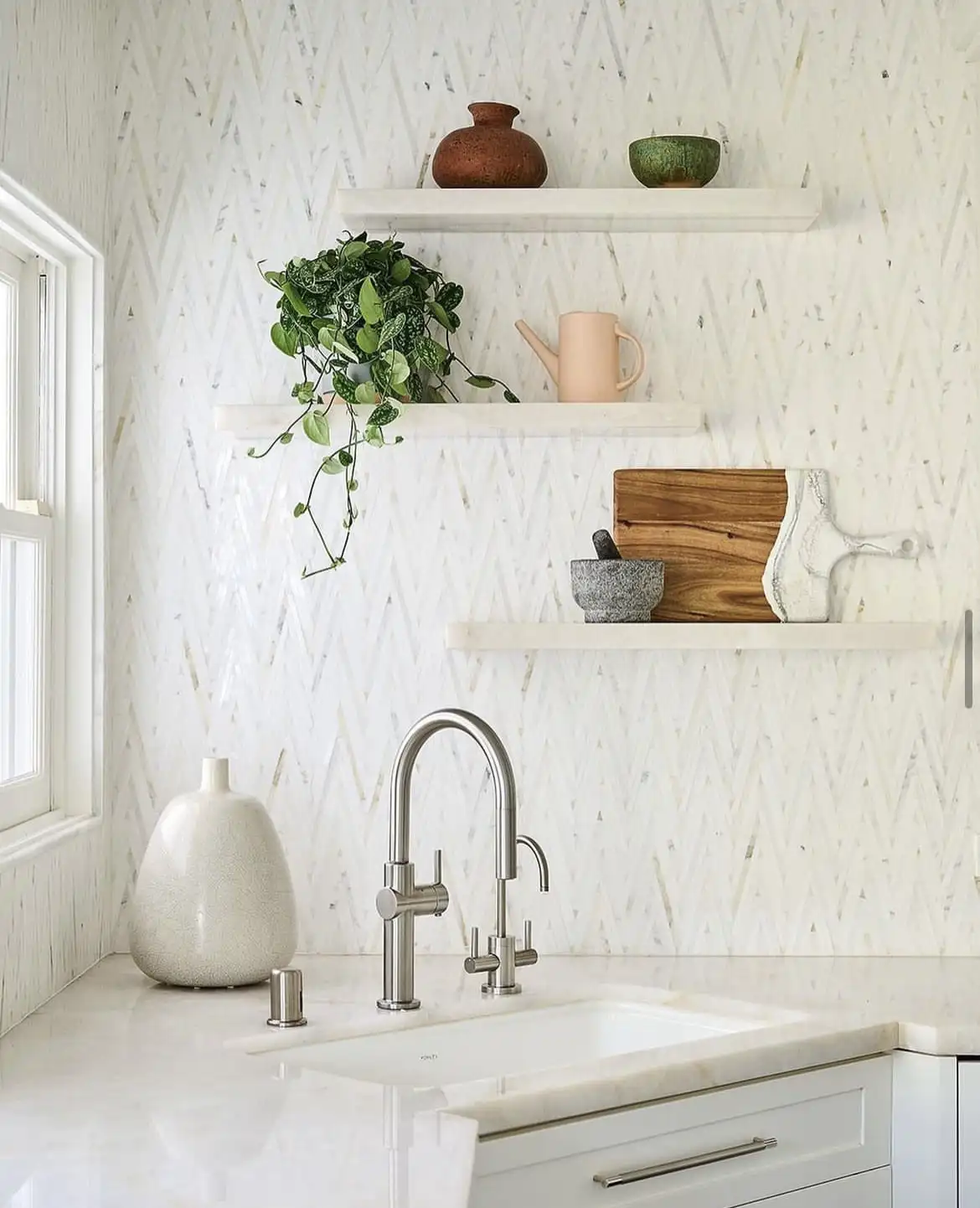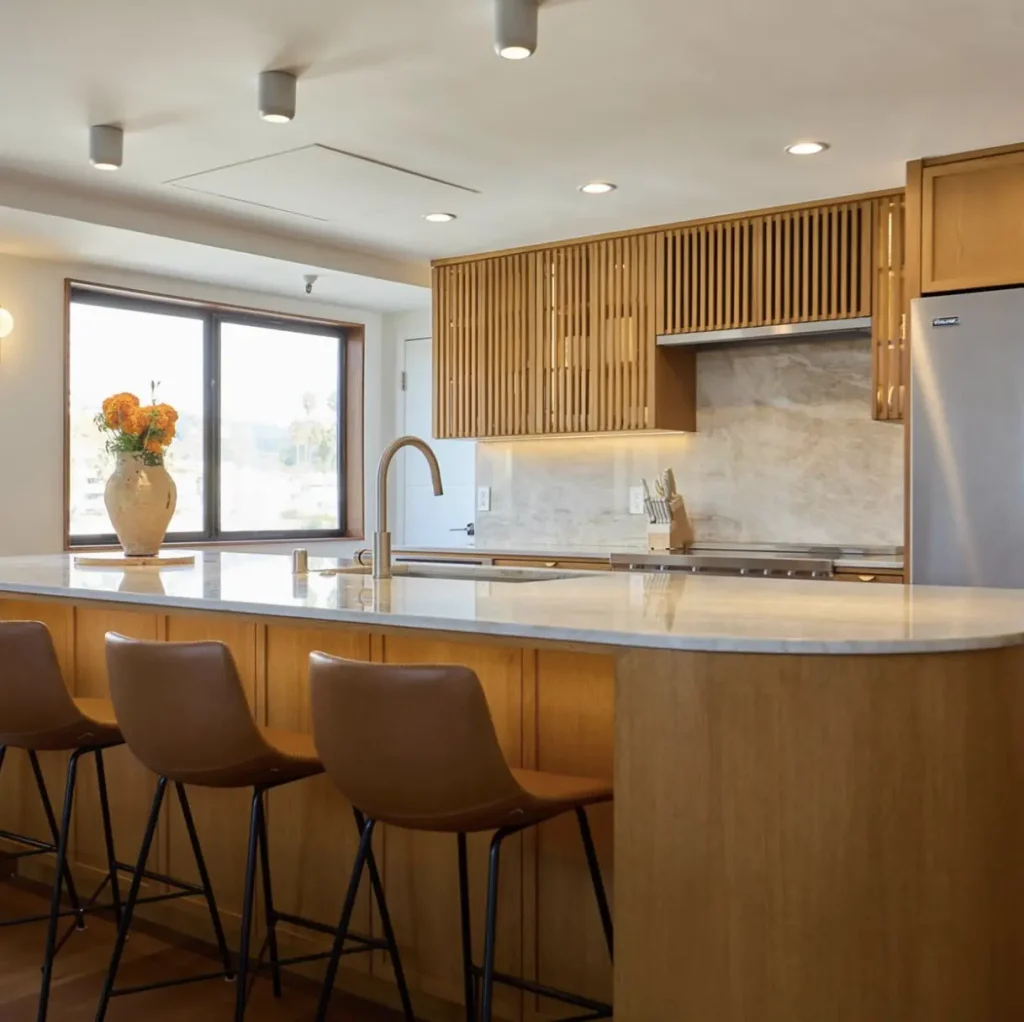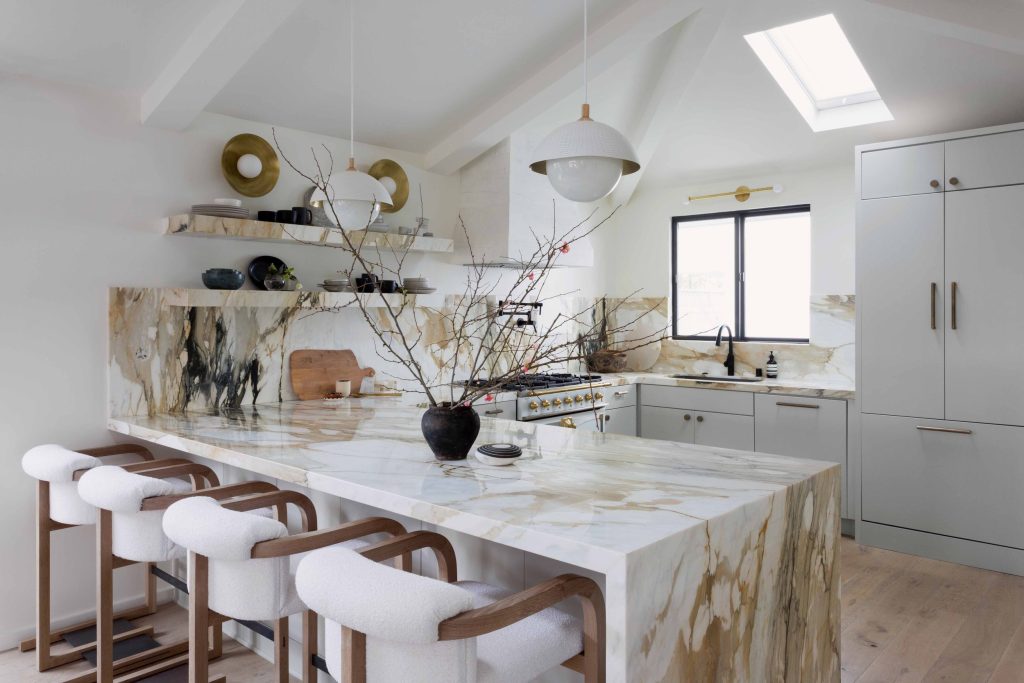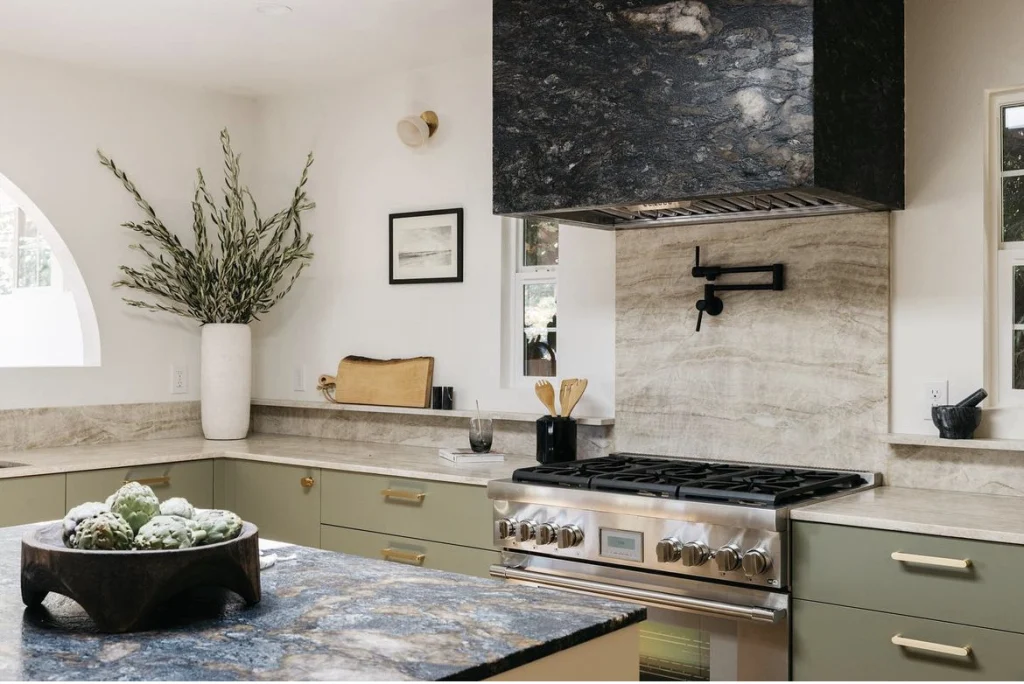Countertop material is a cornerstone of luxury kitchen design, setting the tone and aesthetic for the entire space. Beyond mere functionality, it’s a statement piece that reflects the homeowner’s taste and lifestyle. Selecting the right material involves balancing several key factors to ensure both beauty and longevity. This article explores various luxury countertop materials, discussing their unique properties, pros, cons, and suitability for different kitchen styles.
Key Criteria When Choosing a Luxury Countertop Material
Choosing the right luxury countertop material involves considering several crucial factors to ensure it aligns with your lifestyle, budget, and aesthetic preferences.
The ideal material should not only enhance the visual appeal of your kitchen but also withstand the rigors of daily use. Here are the key criteria to keep in mind:
- Durability: This refers to the material’s resistance to scratches, chips, heat, and stains. High-traffic kitchens or those where heavy cooking is frequent will benefit from more durable materials.
- Maintenance: Consider how much effort you’re willing to put into upkeep. Some materials require regular sealing and special cleaning products, while others are virtually maintenance-free.
- Aesthetics: The look and feel of the material are paramount. Consider the color, pattern, veining, and finish (e.g., polished, honed, leathered) and how they will complement your overall kitchen design.
- Porosity: Less porous materials are more resistant to staining and bacterial growth, making them more hygienic and easier to maintain.
- Environmental Impact: For some, the sustainability of the material, its sourcing, and its recyclability are important considerations.
2025 Trends in Luxury Countertops
The world of luxury kitchen countertops is constantly evolving, with 2025 trends leaning towards a blend of timeless elegance and modern innovation. Homeowners are increasingly looking for materials that offer both striking visual appeal and practical performance. Here’s a glimpse into what’s trending:
- Bold Veining and Dramatic Patterns: Expect to see more countertops featuring prominent, artistic veining, mimicking natural marble but often in more durable materials like quartz and porcelain. Think statement islands that draw the eye.
- Matte and Honed Finishes: While high-gloss finishes remain popular, there’s a growing demand for matte or honed finishes. These offer a softer, more sophisticated look and can be more forgiving with fingerprints and minor imperfections.
- Dark and Moody Hues: Moving beyond classic whites and grays, dark countertops in shades of charcoal, deep brown, black, and even rich blues and greens are gaining traction. These create a dramatic, luxurious feel, especially when paired with lighter cabinetry.
- Sustainable Materials: There’s a rising interest in eco-friendly options, including recycled glass countertops, reclaimed wood, and responsibly sourced natural stones.
- Textured Surfaces: Beyond traditional smooth finishes, textured surfaces like leathered or brushed finishes are becoming more popular, adding tactile interest and a unique dimension to the kitchen.
- Large-Format Slabs: For materials like porcelain and quartz, the trend is towards larger slabs with minimal seams, creating a seamless, monolithic look that enhances the sense of spaciousness and luxury.
5 Best Materials for Luxury Kitchen Countertops
1. Quartz
When it comes to kitchen countertops, we think quartz is a fantastic option. It’s become super popular in recent years, and for good reason.
It’s not just about looks; it’s about practicality too. We’ve seen it in so many kitchens, and it always seems to hold up well.
Quartz is an engineered stone, meaning it’s made from natural quartz combined with resins and pigments. This gives it a consistent look and makes it incredibly durable. Unlike some natural stones, you don’t have to worry about sealing it regularly, which is a huge plus for busy households.
Here’s a quick rundown of what we like about quartz:
- Durability: It can withstand a lot of wear and tear.
- Low Maintenance: No sealing required, just wipe it clean.
- Variety: Available in a wide range of colors and patterns, some even mimic natural stones like marble or granite.
2. Marble

Marble countertops? Oh, they’re beautiful, no doubt. But let’s be real, they come with a bit of a reputation. We’ve all seen those stunning kitchens with pristine marble islands, haven’t we? The reality, though, can be a little different.
Marble is synonymous with luxury, and its unique veining adds character to any kitchen.
Marble is a natural stone, so each slab is unique. You’ll find variations in color and veining, which is part of its charm. It’s not just white either; you can find marble in greens, reds, and even blues. It really makes a statement.
But here’s the thing: marble is soft and porous. That means it stains and scratches easily. Some people embrace this. Others? Not so much.
If you’re in the second camp, you’ll need to be super careful. To keep your marble looking its best, you’ll need to seal it regularly, at least once a year.
3. Porcelain
Porcelain is making waves in the kitchen countertop world, and we’re definitely on board. It’s a newcomer, but it’s quickly becoming a favorite for its blend of beauty and brawn. One of the biggest advantages of porcelain is its durability.
We’ve seen some amazing porcelain countertop material that mimics the look of high-end marble, but at a fraction of the cost. It’s a smart way to get that luxurious aesthetic without breaking the bank. Plus, porcelain is non-porous, which means it’s super easy to keep clean and doesn’t require sealing – a huge win in our book.
Here’s a quick rundown of what we like (and don’t like) about porcelain:
- Extremely hard-wearing
- Low-maintenance
- Trendy “newcomer” appeal
We’ve also noticed that using large-format tiles or panels can give your countertops a sleek, contemporary look with minimal seams. Some designers even run the porcelain slab up the wall as a backsplash for a seamless effect. It’s a detail that can really elevate the overall design of your kitchen.
4. Granite
Granite countertops have been a popular choice for a while, and for good reason. While maybe not as trendy as they were in the 90s and early 2000s, they still hold a special place, especially in more traditional kitchens. We think it’s a solid option if you’re after something durable and with a unique look. No two slabs are ever exactly alike, which is pretty cool.
Granite is known for its resistance to scratches and heat. It’s a tough surface, which is why we often recommend it. You can find it in a wide range of colors, from lighter shades to darker, more dramatic tones. Just remember that it needs to be sealed regularly to prevent stains. We’ve found that regular sealing is key to keeping it looking its best.
Here’s a quick rundown:
- Extremely durable
- Natural beauty
- Rich array of colors
And some things to keep in mind:
- Needs sealing to be stain-resistant
- Edges can chip
5. Quartzite

Quartzite is a natural stone that’s gaining serious traction for its stunning beauty and impressive durability. It’s essentially sandstone that has been transformed by heat and pressure, resulting in a very hard and dense material.
We’ve seen it used in kitchens where people want the elegant look of marble but with much more resilience.
The visual appeal of quartzite is often compared to marble, with beautiful veining and a wide range of colors and patterns. However, unlike marble, quartzite is significantly less porous and much harder, making it more resistant to staining and etching. This makes it a fantastic choice for active kitchens.
When considering quartzite, it’s important to remember that it is a natural stone, so variations in color and pattern are to be expected. Proper sealing is still recommended to maintain its stain resistance. Despite the need for sealing, its overall durability and aesthetic make it a top contender for luxury kitchen countertops.
Wrapping It Up: Picking Your Perfect Countertop

We’ve gone over a bunch of great options for luxury kitchen countertops. It’s clear there’s no single “best” choice for everyone. What works for one person might not work for another, and that’s totally fine.
We really hope this article gave you some good ideas and helped you think about what you want. Remember, your kitchen is a big deal, and the countertops are a huge part of that.
Take your time, do some more looking around, and pick something you’ll love for years to come. We know you’ll make a great choice.
Discover Our Exclusive Luxury Porcelain and Quartz Brands
When it comes to selecting the perfect material for your high-end kitchen, brand quality matters. That’s why we work only with the most prestigious names in the industry.
If you’re drawn to the sleek sophistication of porcelain, we proudly offer top-tier options from brands like Atlas Plan, Neolith, Dekton, Porcelanosa, Terracanto and Caesarstone Porcelain, all known for their large-format slabs, exceptional durability, and stunning finishes that elevate any kitchen design.
For those who love the look and performance of quartz, we carry exclusive lines from Cambria, Compac, Caesarstone, Mikado, Eternos, Viatera and Silestone HanStone offering surfaces that combine refined beauty with outstanding durability and innovation.
No matter your style or preference, we have the ideal material to turn your kitchen into a luxurious, functional, and timeless space.
Personalized Support for Truly Unique Projects
With decades of experience in custom kitchen design, our team is ready to guide you in finding the perfect balance between aesthetics, functionality, and luxury.
Get in touch or visit us to explore how we can help transform your kitchen with the finest materials available.
Frequently Asked Questions
What makes a kitchen material ‘high-end’ or ‘luxury’?
When we talk about ‘luxury’ kitchen materials, we’re talking about products that are top-notch in quality, last a long time, and look amazing. These materials can fit into any kitchen style, whether you like old-fashioned, rustic, or super modern looks. Just know, these materials are usually more expensive.
Why is marble considered a luxury countertop material?
Marble is a natural stone, and every piece is special. It just screams fancy. The colors and swirly patterns make any room look instantly better. You can get marble that’s shiny (polished) or dull (honed). Honed marble is better at hiding scratches, which is good because marble is one of the most expensive and needs a lot of care.
What’s the deal with quartz countertops right now?
Quartz is still super popular because it’s really tough, easy to take care of, and comes in tons of designs. What’s new is that companies are making quartz that looks even more like real stone, or even concrete or leather. People love quartz because it doesn’t stain, scratch, or hold germs easily.
How can you help me choose the right materials for my luxury kitchen?
We’ve been helping people design kitchens for over 40 years. We know all about custom cabinets and have worked with every material you can imagine for luxury kitchens. We can guide you to the best choices for your home.
Are there any new trends for luxury countertop colors?
While light countertops are still common, darker colors like charcoal, dark brown, black, and even dark green or blue are becoming popular. These dark colors make a statement and look great with lighter cabinets or metal accents. They give a modern and fancy feel to the kitchen. To keep the space from feeling too dark, we often pair them with lighter backsplashes.

